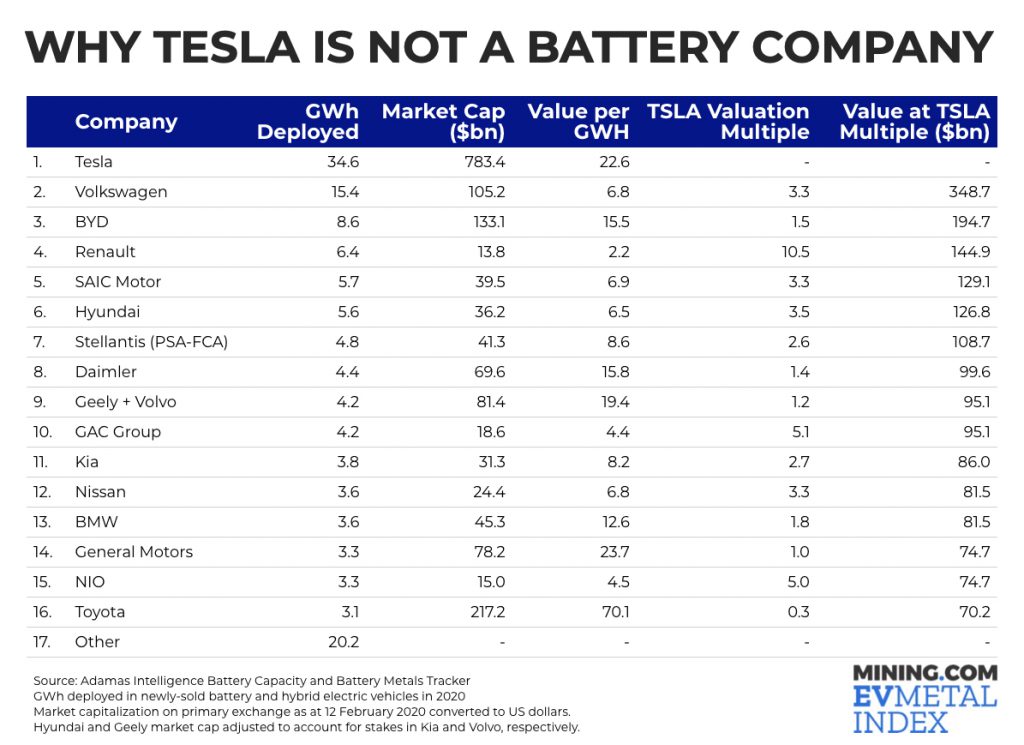GWh for GWh comparison shows Tesla isn’t a “battery company”
Astonishingly it wasn’t until 2017 that executives at the world’s largest auto companies identified battery electric vehicles as the top trend in the industry.
While announcements by incumbents of going electric and spending x amount of billions doing so have come thick and fast since then, Tesla is still way out front.
No matter how many diesel and gasoline cars the likes of Toyota, Volkswagen, GM, Renault, Hyundai et al sell, it’s all for nought
Last year the company was responsible for one in every four MWh hours in passenger cars hitting the road.
In 2020 Tesla deployed more battery capacity than its four nearest competitors combined.
Shorting Tesla has been a widowmaker trade and fans of the company and its CEO amped up the stock over 700% in 2020, and double digits so far this year.
With a market capitalisation around $800 billion, TSLA is worth more than the next nine auto companies combined.
ICE, ICE bye bye
Tesla’s relative valuation shows investors regard the age of the internal combustion engine as well and truly over.
No matter how many diesel and gasoline cars the likes of Toyota, Volkswagen, GM, Renault, Hyundai et al sell – around 64 million in 2020, the worst year in decades – it’s all for nought.
In order to test this theory MINING.COM assigned a value of zero to other automakers’ traditional vehicle business.
This way investors can appraise Tesla competitors solely on their ability to sell battery powered light duty vehicles.
Giga whaaat?
Tesla longs love the company so much they rate the batteries as having more value than those in the EVs of competitors (often made by the same cell manufacturers).
At Tesla’s current market valuation, every GWh in the company’s cars sold last year is worth nearly $23 billion in market cap.
The company’s closest competitor Volkswagen, attracts less than $7 billion for the same achievement.
Volkswagen would be worth $350 billion if investors were as charged up about its electric cars as they are about Tesla’s.
Again, its electric cars only – anything else Wolfsburg produces is worthless under this scenario.
Those Bugattis and Bentleys? Not even worth anything as scrap metal.

iPhones with wheels
BYD, which unlike Tesla already manufactures its own cells, is significantly higher valued than the European marques on a cell-for-cell basis.
But if investors built their dreams around BYD like they do around Tesla, the Chinese company beloved by Buffett would be worth $60 billion (or 4.5 Renaults) more.
Renault is the most underrated EV-maker (maybe investors just don’t believe it’s Avantime enough).
Apple-Hyundai rumours became Apple-Renault rumours last week but even the idea of French-made iphones on wheels could not grab the imagination of investors or attract dollars to Boulogne-Billancourt.
Renault’s Zoe last year also overtook the Model 3 to become the best-selling electric car in Europe, but investors believe the Zoe’s 52KWh is worth a tenth of the 50KWh in the Model 3 (granted, the Zoe’s touch screen is only a 7-inch and it doesn’t have Mode Ridicule).
China’s Tesla and… did you say Stellantis?
NIO, which almost always gets called China’s version of Tesla, hasn’t been able to get much of that valuation magic rub off either. If anyone really thought NIO was China’s Tesla it would be worth $58 billion (or 4.5 Renaults) more.
Then there’s Stellantis – freshly formed from Peugeot, Chrysler and Fiat.

Stellantis.
Sounds like an electric car company. Clearly investors don’t think it is.
Conspicuous by their absence are Ford and Honda, which between them could only muster little over 1 GWh last year.
Like Toyota, the relative size of the companies and the limited number of battery-powered cars they sell, inevitably assign a high value to these company’s on a GWh basis.
In the upside down world of electric car company valuations, once the Fords, Hondas and Toyotas start to catch up, expect the ratio to go in reverse.
(Toyota and Honda’s “mind-bogglingly stupid, staggeringly dumb” fuel cell vehicles are not accounted for in this analysis.)
TSLA la land
When confronted with talk of a bubble in Tesla stock, fans would often counter that Tesla is not a car company, it’s a battery company.
Of all the justifications for Tesla’s sky-high market cap, robotaxi is the one trotted out most frequently
Don’t know what that makes Tesla’s cell suppliers Panasonic, CATL and LG Chem, but okay.
Also, the accompanying table.
When that doesn’t work it becomes: Tesla is not a car company, it’s a tech company (or an insurance and HVAC company).
Full self driving, over the air updates, really really big touch screens, yottabytes of driving data fed into AI, factories you can see from space, cars you send into space, bitcoin, Plaid+ and all that.
The robotaxi rationale
Of all the tech justifications for Tesla’s sky-high market cap, robotaxi is the one trotted out most frequently, including by Musk who recently mused that using Teslas as robotaxis increases the cars’ utility by a factor of five and by extension the company making them.
“There is a more than 30 per cent chance in our view that Tesla is the autonomous taxi network of the US,” ETF superstar Cathie Wood of Ark Investment Management, and Tesla cheerleader in chief told the FT last week.
Only more than 30%?
Perhaps Wood saw this video from September of a Model 3 navigating the Consumer Reports parking lot.
One of the many arguments against the robotaxi rationale for Tesla at $800 billion and beyond is that full self-driving cars are at least 10 years away.
Judging by the video it could take a little longer.




